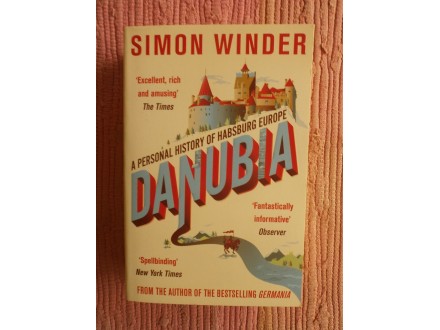Simon Winder - Danubia
| Cena: |
| Želi ovaj predmet: | 7 |
| Stanje: | Nekorišćen |
| Garancija: | Ne |
| Isporuka: | Pošta Post Express Lično preuzimanje |
| Plaćanje: | Tekući račun (pre slanja) Pouzećem Lično |
| Grad: |
Beograd-Čukarica, Beograd-Čukarica |
ISBN: Ostalo
Godina izdanja: 2014
Jezik: Engleski
Autor: Strani
Simon Winder - Danubia
A Personal History of Habsburg Europe
Picador, London, 2014. godine na 550. strana.
Knjiga je nova.
For centuries much of Europe and the Holy Roman Empire was in the royal hands of the very peculiar Habsburg family. An unstable mixture of wizards, obsessives, melancholics, bores, musicians and warriors, they saw off―through luck, guile and sheer mulishness―any number of rivals, until finally packing up in 1918. From their principal lairs along the Danube they ruled most of Central Europe and Germany and interfered everywhere―indeed the history of Europe hardly makes sense without the House of Hapsburg.
Danubia, Simon Winder`s hilarious new book, plunges the reader into a maelstrom of alchemy, royalty, skeletons, jewels, bear-moats, unfortunate marriages and a guinea-pig village. Full of music, piracy, religion and fighting, it is the history of a strange dynasty, and the people they ruled, who spoke many different languages, lived in a vast range of landscapes, believed in rival gods and often showed a marked ingratitude towards their oddball ruler in Vienna. Readers who discovered Simon Winder`s storytelling genius and infectious curiosity in Germania will be delighted by the eccentric and fascinating tale of the Habsburgs and their world.
Catastrophe struck Austro-Habsburg Europe on 28 June 1914, when Franz Ferdinand, Archduke of Austria, was assassinated by a Serbian nationalist in Sarajevo. The equilibrium of Europe was now shattered, and two world wars would not be enough to repair the damage. Like Magris, Winder makes a pilgrimage to the Military History Museum in Vienna, where Ferdinand`s blood-stained tunic is on display. Ferdinand`s was the `most successful assassination in modern history`, not least because it resulted in a vastly expanded Serb-ruled state only `finally dismantled` in the Yugoslav wars of the 1990s.
The Habsburg interest in Italy, consolidated under the 1500-58 reign of Charles V, led to the appropriation of Venice and the Adriatic city`s long, drawn-out struggle against Habsburg domination three centuries later. Winder tells the story of the seaport`s ill-fated attempt in 1848 to resist its Austrian occupiers and declare an independent Venetian republic. Venice had become the Habsburg trophy city, on no account to be surrendered. The occupying army, led by Marshal Radetzky, pulverised the city with cannon and mortar until it capitulated on 24 August and remained a fiefdom until Italy`s unification in 1860-61.
VAZNO
VAZNO !!!!!!!!!!!!!!!!!!!!!!
OD SEPTEMBRA DO OKTOBRA SMO NA ODMORU
SVE KUPOVINE U OVOM VREMENSKOM INTERVALU CE BITI POSLATE POSLE ODMORA
HVALA NA RAZUMEVANJU ;)
Ako osoba nije iz Beograda, knjigu saljem postom kao preporucenu tiskovinu o trosak kupca. Slanje Post Express-om je takodje izvodljivo uz pristanak kupca na njihove uslove.Licno preuzimanje u centru uz dogovor.
Ne saljem van Srbije.
Zbog visoke cene provizije post expresa predlazem da prethodno uplatite novac na ziro racun, dok cu vam knjigu poslati post expresom kome cete platiti samo postarinu.
Sada je prosecna postarina post expresa 500 dinara pa navise.
Postarina postom kao tiskovina je oko 240 dinara.
Predmet: 33768295











